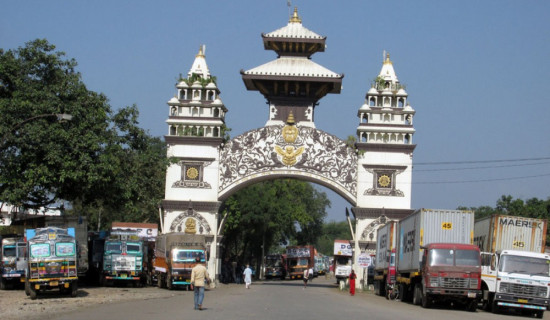- Sunday, 15 February 2026
Promote Gender Equality In Politics
Shyam Prasad Mainali
Democratic politics aims to achieve the twin goals of exercising power as well as achieving justice and equality. Ensuring more meaningful representation of women in politics has been a demand for decades. Since 2007, political movements have aimed to increase women’s participation in politics and there has been some success such as a policy of reservation has been included in the constitution. However, this has not been satisfactory. The numerical increase in women’s political representation is not sufficient as there should be efforts towards building the capacity of female leaders.
This, in turn, can lead to macro-level progress and overall prosperity of the country. A patriarchal legacy exists in Nepal and women have been discouraged from participating in the public affairs. An intersectional perspective is also needed as further marginalisation occurs between ethnic, religious, regional and caste groups.
Legal provisions alone are not enough to ensure the upliftment of women as de facto changes in culture is required as they pose the main hurdles. Political parties reflect the traditional patriarchal mindset. Leading roles within most parties are predominantly occupied by men. Although the law states that fair representation of women in parties should be ensured, the reality is far from that. Only around 10 per cent of policy and decision-making levels are said to be occupied by women. Due to lack of education, economic resources, social expectations, women are unable to meaningfully participate in politics. Additionally, many women are discouraged by men to pursue politics due to the notion that “men are born leaders.”
Nepotism
Those women who do find themselves in positions of power are often there due to their close relations or kinships with male leaders. Provisions of proportional representation system has also led to its exploitation as 56 women representatives were either the wives or family members of a male representatives.
Additionally, other representatives were women from aristocratic families or other elite groups. Additionally, party politics has had a negative impact on women’s representation as parties are more inclined to select women who toe the party line. This means women representatives, instead of progressing the cause of women, are more committed to the cause of the party which may be antithetical to gender progress in the country. Proportional representation, which was introduced to facilitate the representation of Nepal’s marginalised, has been exploited to elect those from elite backgrounds and women’s representation has been largely tokenistic. The increase in women’s representation was mainly due to legal requirements as opposed to an actual commitment from the parties to address the deep-rooted gender inequality within the country. However, despite this, it is important to mention the fact that women have held some higher leadership positions such as the President, Chief Justice, Speaker, and Deputy Prime Minister.
In global context, women have played key roles in political movements. However, when movements cease, the women are once again relegated to traditional roles and neglected from politics. Even those who manage to carve out a political career find themselves side-lined from decision-making roles as capable women are often excluded in favour of less proven candidates who have better political connections. Women’s participation in all elected bodies is constitutionally guaranteed, but equal participation in the state organs has been far from the reality.
There should be equal opportunities and equal access to resources, structure, and regulation. An appropriate system needs to be developed so that politicians in power should recognise and support deserving female candidates rather than favouring those with close ties. Political spaces do not exist in isolation, they co-exist with other social, cultural, and economic spaces. Importantly, the unequal gender dynamics that exist in the society should be eliminated. Social, political, economic as well as cultural empowerment of women is very crucial to the overall development of the country.
Meaningful participation
Nepal has undergone slow and steady socio-political changes since the political 1951 revolution. Meaningful participation, especially in political arena, has not been accessible to many marginalised women. The increase in women’s participation can be largely attributed to the fact that their rights are secured legally.
This progress can be seen as the Panchayat period granted only three seats for women whereas the current constitution reserves far more including higher level positions. As mentioned above, women have also been elected to positions such as the President, Speaker and ministers. However, there are certain facts that vastly limit the progress in the gender equality and its political sphere.
These include the pervasive patriarchal attitudes which restrict women in domestic role as opposed to political role as those are said to be for men. The proportional representation system, although beneficial in practice, has been exploited to ensure the participation of women from elite groups, those who have close ties to male leaders and those who do not question the party line. As a result, this has dealt a huge blow to the cause of women’s progress in Nepal. Only when these issues are addressed, will there be a potential for significant changes socially, politically, and economically for women.
(Mainali is former secretary of the government.)

















